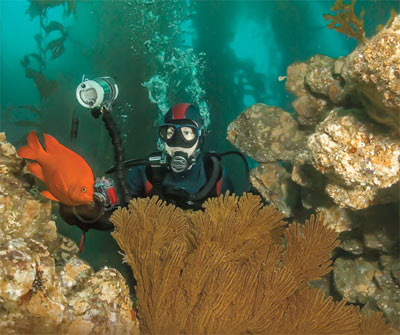On a recent trip to Cocos, my computer failed on the fourth dive of the trip (first dive of the second day). As I fired it up in the dive dinghy right before we left the mother ship, the screen lit up and then dimmed, went through its countdown procedure, beeped, showed a low-battery warning—and then went blank. Reactivating it right away, it went through the same procedure and went into normal dive mode. The problem was that it had erased all the residual nitrogen information from the previous day’s dives and was showing me “clean” with maximum bottom times available at all depths. Needless to say, this was incorrect.
The reactions that followed amazed me and spurred this article (or rant, if you prefer).
I stood up and my fellow divers said, “What are you doing?” I said, “My computer crapped out. I’m done diving for 24 hours.” They said, “Why?” I said, “Because that’s what you do when your computer fails and you forgot to bring your backup.” And they said, “No, no. You don’t have to miss any dives.” And they proceeded to give me a number of (unacceptable to me) options, which included just staying near my buddy and using his computer, switching to nitrox and not worrying about it, using my computer but not pushing the limits, and other not-by-the-book thoughts.
Now the reason this struck a nerve with me was that these were very experienced divers, including many instructors, all of whom should have known better. And it got me to thinking: Why do we, as a culture of divers, think the rules don’t apply to us or that we can get around them when the rules interfere with what we want to do.
Anytime we dive, we “agree” to play by a certain set of rules. If you’re diving tables, you agree to consider your dive a square profile. If you’re diving nitrox with a computer set on air, you agree to abide by air limits, even though you “know” you have more time. We agree to return with a certain minimum amount of air, etc., etc., etc.
But it seems that when these “rules” get in the way of what we want to do, or limit the interaction we’ll have with the ocean, we decide that they can be bent (no pun intended). Went into deco? No problem. The computer was set on air and you’re diving nitrox so you’ve got more time. Running low on air but have a really cool fish in front of you? No problem. Suck the tank down a little lower because nothing will go wrong on the way back to the surface. Lost your buddy? No problem. Why abort your dive and surface when he’s probably okay? But those aren’t the procedures we agreed to in the first place. Yes, these “rules” put limitations on us but it’s in our own best interests not to go changing them mid-trip or mid-dive or whenever.
I remember some years ago running a multi-day trip and in the afternoon of the first day, a diver’s computer stopped working. He told me that he was just going to keep diving shallow. I said, “No, you’re out of the water for 24 hours and then you’re going on tables.” He said, “Well, if I had a computer it would let me do the dive.” I said, “Show me the computer that’s got a record of your previous dives that will let you do that and I’ll be happy to let you go in.” He sat out for 24 hours.
And just because you got away with something once doesn’t mean it wasn’t a bad idea. In diving, we dodge bullets all the time. We frequently get away with bad behavior without any ill effect, but that doesn’t mean that what we did was a good idea. It simply means we dodged a bullet. And just because you didn’t hear a bullet whiz by your head doesn’t mean there wasn’t a risk.
The other thing people fail to think about is what happens if the-rules-don’t-apply-to-me decision is wrong and you get hurt. Now we’ve got to get you to a chamber (or worse), suspend diving to get you taken care of, and alter or ruin the trip for everyone else just because you thought the rules didn’t apply to you. On the aforementioned Cocos trip, it’s a 40-hour ride back to Costa Rica to get treatment and there are no helicopters to come get you. Why let selfish and inconsiderate behavior ruin the trip for everyone else?
I was appalled one time (coincidentally on a second Cocos trip) to see a diver (1) have her back-up computer go into violation mode because she wasn’t watching her ascents, (2) then have it lock her out because she continued diving anyhow using her primary computer (which was fine), (3) and then forgetting her primary computer on a subsequent dive (it had a quick-disconnect and she left the computer sitting on the boat ‘s photo table) but figuring everything was okay as long as she stayed with the dive guide. Madness.
In my job as a Forensic Consultant for the L.A. County Coroner when there’s a scuba fatality, we almost always see some sort of diver error in judgment as a major factor in the death. It may be someone forgetting to turn on their air, not paying attention to their gauges, over-weighting themselves, altering their equipment rendering it useless, or some other avoidable mistake.
Diving has rules. You can’t just do whatever you want. Get over it. Yes, sometimes it’s going to cost you a dive or two or three. But that’s better than having it cost you a major injury or your life. Understand the rules, play by them, and get the most out of your diving.










